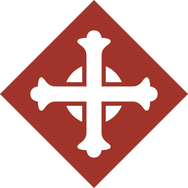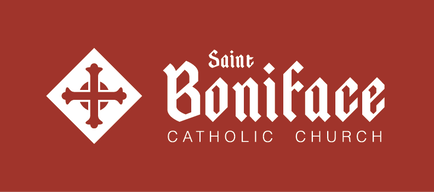Prayer and Sacraments
The Catechism of the Catholic Church states that "The whole liturgical life of the Church revolves around the Eucharistic sacrifice and the sacraments" (paragraph 1113). At Saint Boniface, Sunday Mass is truly the center of our community and prayer life where we gather to pray, worship, and give thanks to God. Other sacraments and rites mark the important stages of our spiritual life from our rebirth in Baptism as adopted sons and daughters of God to the Church's burial rites in which our bodies and souls are entrusted to the mercy of God.
In most cases, a period of preparation is suitable before receiving a sacrament (or receiving it for the first time). Sacramental preparation is a process of catechesis (teaching), prayer, and formation leading up to a person's reception of a sacrament. The time and content of preparation depends on the age, background, and circumstances of the individual being prepared as well as the sacrament being received.
In most cases, a period of preparation is suitable before receiving a sacrament (or receiving it for the first time). Sacramental preparation is a process of catechesis (teaching), prayer, and formation leading up to a person's reception of a sacrament. The time and content of preparation depends on the age, background, and circumstances of the individual being prepared as well as the sacrament being received.
Sunday Liturgy
The spiritual life of Saint Boniface is largely centered around our weekly celebration of the Sunday Eucharist. Mass is celebrated Sundays at 8:30 and 11:00 AM. Confessions are heard between Masses from 10:15 to 10:45 AM. On most holy days of obligation, Mass is offered at 12:00 noon (but check the bulletin to be sure). Confessions are heard in the north-east confessional; that is, on the right side, closest to the front as you face the altar.
Christian Initiation of Adults
Adults who wish to enter the Catholic Church do so through a process of initiation and conversion involving study of Catholic teachings, prayer, and being welcomed into the parish community. There is no one-size-fits-all program: the length and specifics of the process will depend on each person's circumstances and discernment of when they are ready to move forward. For unbaptized adults, the Church provides several rites that take place at different points in the process and which culminate in the reception of Baptism, Confirmation, and Eucharist during the Easter Vigil.
For adults who have been baptized in a non-Catholic community and now wish to become Catholic, a process of formation appropriate to their background will prepare them to celebrate the sacrament of Reconciliation and be received into the full communion of the Catholic Church, including the sacraments of Confirmation and Eucharist, at a Sunday Mass. Similarly, adults who were baptized Catholic but were not brought up in the faith or who did not complete their sacramental initiation should speak to a priest in order to prepare to receive these important sacraments.
For adults who have been baptized in a non-Catholic community and now wish to become Catholic, a process of formation appropriate to their background will prepare them to celebrate the sacrament of Reconciliation and be received into the full communion of the Catholic Church, including the sacraments of Confirmation and Eucharist, at a Sunday Mass. Similarly, adults who were baptized Catholic but were not brought up in the faith or who did not complete their sacramental initiation should speak to a priest in order to prepare to receive these important sacraments.
Baptism of Children
From her earliest days the Church has encouraged parents to bring their children for baptism soon after birth. Having your child baptized is a powerful example of God's generous love that heals and saves us apart from anything we could do to try to deserve it. Baptisms at Saint Boniface usually take place at one of our Sunday Masses, but a Baptism outside of Mass is also possible. For out-of-town parents, you will need to contact your local parish and work with them to receive the formation that they recommend before we will move forward with your child's Baptism. In-town parents who are not parishioners of Saint Boniface can schedule a formation session with the associate pastor or can complete the formation available at their own parish. Children to be baptized must have at least one godparent who is a practicing Catholic. Please visit our Connect page or contact the parish office to request Baptism for your child.
Sacramental Preparation of Children
At Saint Boniface, sacramental preparation for children is offered on a one-on-one basis according to the needs of each child and family rather than through standard religious education classes or programs. Please contact the parish office if your child is in need of sacramental preparation so we can determine the best plan for you.
Typically children who were baptized as infants celebrate the Sacrament of Reconciliation in preparation for their first reception of Holy Communion during second grade. In the Archdiocese of Louisville, young people who have been baptized and received first Communion typically receive the sacrament of Confirmation during their eighth grade year after completing a formation process of catechesis, prayer, and service.
For children around the age of seven or older who have not been baptized or who have not received any religious education or formation, a process similar to the Christian initiation of adults is used, but adapted to the child's age and circumstances. This process of catechesis and formation will typically lead to the child's reception of Baptism (if they are unbaptized), Confirmation, and Eucharist (First Communion) in a single celebration. Please contact a priest so we can discern the best path forward for you and your child.
Typically children who were baptized as infants celebrate the Sacrament of Reconciliation in preparation for their first reception of Holy Communion during second grade. In the Archdiocese of Louisville, young people who have been baptized and received first Communion typically receive the sacrament of Confirmation during their eighth grade year after completing a formation process of catechesis, prayer, and service.
For children around the age of seven or older who have not been baptized or who have not received any religious education or formation, a process similar to the Christian initiation of adults is used, but adapted to the child's age and circumstances. This process of catechesis and formation will typically lead to the child's reception of Baptism (if they are unbaptized), Confirmation, and Eucharist (First Communion) in a single celebration. Please contact a priest so we can discern the best path forward for you and your child.
Marriage and Vocations
We at Saint Boniface are proud that many couples desire to celebrate their wedding at Saint Boniface. Marriage preparation typically lasts at least six months and usually takes place between the engaged couple and the priest or deacon who will preside at the wedding. For more information regarding weddings at Saint Boniface, please visit our Weddings page or contact the parish office.
Christ calls some individuals to serve his Church as priests, deacons, and consecrated men and women. If you have questions regarding a vocation to the priesthood, diaconate, or consecrated life, please speak to a priest or contact the Archdiocese of Louisville Vocation Office.
Christ calls some individuals to serve his Church as priests, deacons, and consecrated men and women. If you have questions regarding a vocation to the priesthood, diaconate, or consecrated life, please speak to a priest or contact the Archdiocese of Louisville Vocation Office.
Pastoral Care of the Sick
If you or a loved one are unable to attend Mass due to health or physical limitations and would like Holy Communion brought to your home, please contact the parish office.
The sacrament of Anointing of the Sick should be requested for any Catholic facing serious illness, increasing struggles due to old age, or before undergoing surgery. Because this sacrament should not be delayed until the point of death, it is no longer referred to as "extreme unction" or "last rites." As the Second Vatican Council taught, "as soon as anyone of the faithful begins to be in danger of death from sickness or old age, the fitting time for him to receive this sacrament has certainly already arrived." When death is imminent, we are exhorted to receive the Eucharist as viaticum, "food for the journey." Please call the parish office or speak to a priest if you or a loved one are in need of anointing or viaticum. In an emergency, call the parish office 24/7: you will have the opportunity to leave a message and the priest on call will be notified immediately.
The sacrament of Anointing of the Sick should be requested for any Catholic facing serious illness, increasing struggles due to old age, or before undergoing surgery. Because this sacrament should not be delayed until the point of death, it is no longer referred to as "extreme unction" or "last rites." As the Second Vatican Council taught, "as soon as anyone of the faithful begins to be in danger of death from sickness or old age, the fitting time for him to receive this sacrament has certainly already arrived." When death is imminent, we are exhorted to receive the Eucharist as viaticum, "food for the journey." Please call the parish office or speak to a priest if you or a loved one are in need of anointing or viaticum. In an emergency, call the parish office 24/7: you will have the opportunity to leave a message and the priest on call will be notified immediately.
Christian Burial
Upon the death of a loved one, the celebration of the Funeral Mass and burial rites are beautiful and meaningful ways to honor their memory and entrust their soul to God. Please contact the parish office or a priest so that we can assist you in planning a Catholic funeral for your loved one and walking with you as you mourn.

